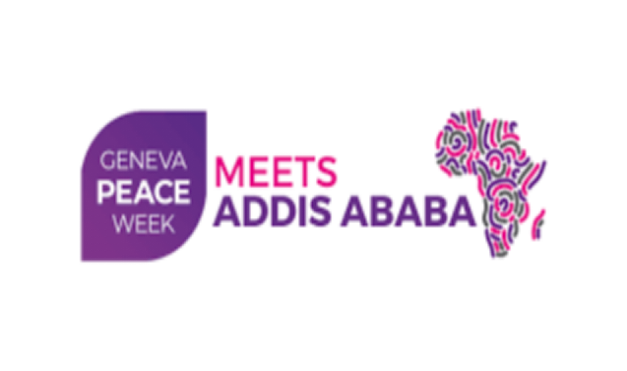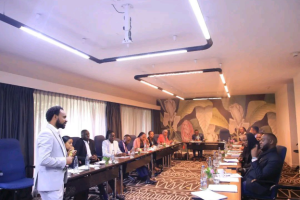
Ethiopia’s growing role as a pivotal player in fostering peace and stability across the African continent continues to garner significant international recognition. This increasing global acknowledgment underscores the nation’s impactful contributions to regional conflict resolution.
From actively facilitating dialogues to deeply engaging in intricate peace processes, Ethiopia has consistently demonstrated a strong commitment to achieving peaceful resolutions for complex challenges within Africa. This dedication has been widely noted, with numerous international bodies and nations expressing their appreciation for Ethiopia’s proactive approach and the positive impact of its endeavours.
The recent “Geneva Peace Week Meets Addis Ababa” initiative culminated in a High-Level Plenary on April 7, 2025, under the theme “Geopolitical Challenges for Peace and Security in Africa,” further exemplifies the country’s strong commitment to regional peace.
During this event, Jafar Bedru, the Executive Director of the Institute of Foreign Affairs, delivered remarks on behalf of the Minister of Foreign Affairs (MoFA), Gedion Timothewos (Ph.D.). In his address, Jafar underscored the vital role of the Geneva Peace initiative in fostering essential multilateral collaboration.
He emphasized the value of this timely partnership, noting that in an era characterized by global uncertainty, platforms such as Geneva Peace Week offer more than just clarity; they actively cultivate connection, inspire hope, and facilitate the development of lasting solutions for peace.
The high-level session convened senior policymakers, esteemed diplomats, and leading experts to engage in critical deliberations focused on enhancing Africa’s leadership in peacebuilding and conflict resolution amidst evolving global dynamics.
The discussions centered on Africa’s strategic positioning within major global alliances, its crucial role in multilateral peace and security endeavors, and effective strategies to promote stability and self-reliance in addressing emerging threats.
Key themes that emerged included the imperative of strengthening multilateral cooperation, the significant impact of international alliances on regional stability, and the fundamental importance of locally led peace initiatives. The plenary effectively underscored the necessity of collaborative approaches to ensure Africa’s priorities are robustly represented in international decision-making forums.
Moreover, the international community has voiced strong and consistent support for Ethiopia’s ongoing commitment to achieving lasting peace and stability, particularly signalling the significant progress made in implementing the crucial Cessation of Hostilities Agreement (COHA). This unified stance from the global community underscores the widespread recognition of Ethiopia’s determined efforts to foster enduring peace and shared prosperity for all its citizens.
In a significant joint statement issued in November 2024, key international partners unequivocally affirmed their unwavering dedication to supporting collaborative efforts aimed at delivering lasting stability and prosperity across Ethiopia. This resolute commitment further reinforces the critical importance of a unified approach in bolstering the nation’s vital peacebuilding endeavors.
Samuel Doe, the Representative of the United Nations Development Programme (UNDP), conveyed the organization’s distinct honor in being entrusted by the Ethiopian government and its esteemed partners to expertly manage the multi-partner program specifically designed to support Ethiopia’s Disarmament, Demobilization, and Reintegration (DDR) process.
“We are honored by the trust placed in UNDP by the government and partners to manage the multi-partner programme in support of Ethiopia’s DDR,” he stated. “UNDP has a strong track record of supporting countries across the globe on similar programmes, and we are bringing that valuable experience to this crucial process. Demobilizing and successfully reintegrating ex-combatants back into their communities forms one of the key foundations for building sustainable peace, and we are fully committed to continuing our support for the roll-out of the DDR across all regions.”
This unified and robust support from the global community provides a significant boost to Ethiopia’s ongoing peace initiatives and underscores the shared aspiration for a peaceful and prosperous future for all Ethiopians.
In another significant demonstration of Ethiopia’s commitment to peaceful resolutions, facilitated by Turkish mediation, Ethiopia and Somalia reached a notable agreement aimed at addressing Ethiopia’s need for reliable maritime access. This agreement underscores Ethiopia’s unwavering commitment to peaceful resolutions and fostering robust regional cooperation. The agreement is specifically designed to provide Ethiopia with secure maritime access while fully respecting Somalia’s sovereignty.
In a significant development for regional diplomacy and overall stability, Ethiopia has been successfully elected as a member of the influential African Union (AU) Peace and Security Council.
This noteworthy election took place during the opening session of the 46th Ordinary Session of the African Union Executive Council, held two months prior in Addis Ababa, the same city where Ethiopia hosts the AU summit.
This significant move unequivocally reaffirms Ethiopia’s longstanding and unwavering commitment to actively maintaining peace and security across the entire African continent.
Ethiopia’s election to the Peace and Security Council reflects the country’s strategic and increasingly vital role in advancing critical peace initiatives and effectively addressing conflicts within the region.
MoFA affirmed that this significant election is not merely recognition of Ethiopia’s dedicated efforts in crucial peacekeeping operations but also serves as a powerful acknowledgment of its substantial contributions towards building a safer and more secure Africa for all its citizens.
The nation boasts a rich and extensive history of actively participating in numerous peacekeeping missions and consistently engaging in vital conflict resolution efforts, further solidifying its strong credentials as a key and influential player in continental security arenas.
The Peace and Security Council of the African Union stands as a crucial body with the primary mandate of addressing critical issues related to peace, security, and overall stability throughout Africa.
It plays a pivotal and indispensable role in effectively resolving conflicts, skillfully mediating disputes between member states, and diligently fostering constructive dialogue among all involved parties.
Ethiopia’s newly acquired membership will significantly empower the nation to actively influence important discussions and key decisions regarding ongoing conflicts, notably including those within the often-volatile Horn of Africa, a region that has unfortunately experienced persistent instability over the years.
Ethiopia’s steadfast commitment to the AU’s overarching agenda for peace and security is clearly underscored by its proactive and consistent participation in numerous initiatives specifically aimed at conflict prevention and effective resolution.
The country has consistently been an active and reliable supporter of the AU’s comprehensive peace and security framework, readily contributing troops to various critical peacekeeping missions and actively hosting vital regional dialogues designed to mitigate tensions and promote mutual understanding among conflicting parties.
MoFA emphasized that Ethiopia’s strategic geographical positioning, its significant geographic importance within the region, and its long-standing history of active engagement in crucial diplomatic efforts collectively place it in an exceptionally advantageous position to effectively leverage its new and important role on the Council.
This significant election also comes at a particularly vital time when the African continent faces numerous complex challenges, including ongoing armed conflicts, devastating humanitarian crises, and the increasingly severe impacts of climate change, all of which urgently necessitate a strong, unified, and coordinated response from all AU member states.
Furthermore, the Ministry expressed a strong sense of optimism that Ethiopia’s enhanced representation on the Council will undoubtedly lead to strengthened collaboration with other member states and key international partners, thereby fostering a more cohesive and effective approach to tackling the multifaceted security challenges prevalent throughout the continent.
As Ethiopia diligently prepares to fully assume its important responsibilities on the Peace and Security Council, it is strategically positioned to effectively advocate for collective and concerted efforts that prioritize the achievement of sustainable peace and lasting stability across the continent.
The nation’s active and consistent role within the AU underscores a deep-seated commitment not only to its own national interests but also to the collective welfare and shared prosperity of the entire African continent, powerfully demonstrating the critical importance of solidarity in effectively addressing the pressing security issues of our time.
This widespread international praise not only serves to highlight Ethiopia’s significant diplomatic prowess and its effective engagement on the global stage but also stands as a powerful testament to the inherent potential for African nations to take a leading role in addressing the continent’s complex peace and security concerns. As Ethiopia steadfastly pursues peaceful resolutions and regional stability, the global community watches with hopeful anticipation for a more secure, stable, and prosperous future across the entire region.
BY EYUEL KIFLU
THE ETHIOPIAN HERALD SUNDAY EDITION 29 JUNE 2025



